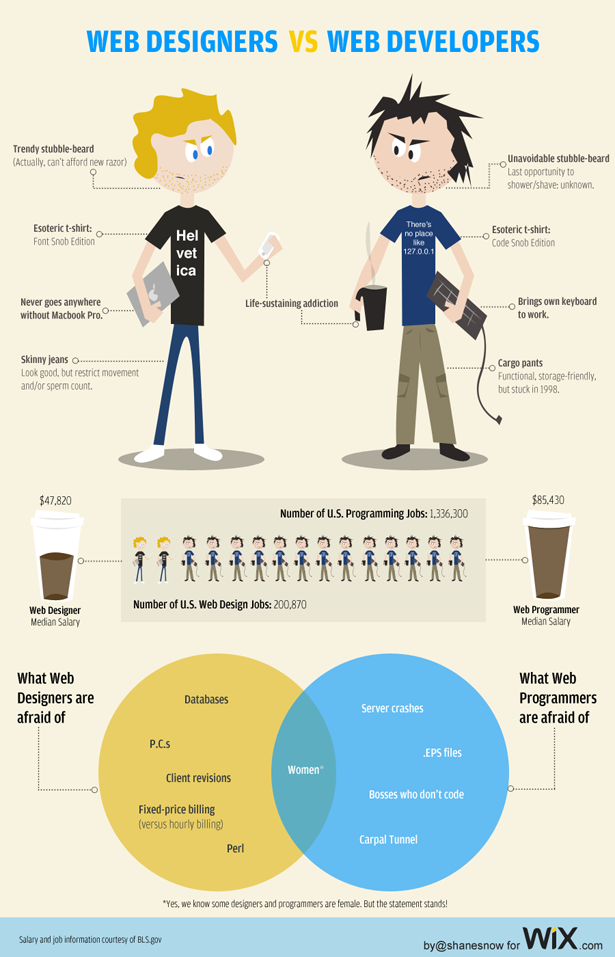 Web design is a multidisciplinary craft. So why do so many of us try and do everything ourselves?
Maybe it’s because we can. Our nature as web designers tells us to build things. We have the capability to handle just about every role in a web design project. If we don’t already have the expertise in a certain skill, then at least we have the self-motivation to teach ourselves and learn on the job. That’s how must of us got to where we are. But is doing it all the right approach?
When you look at the bigger picture, maybe it’s not. For me, my over-arching goals are to build an impressive portfolio of work, land bigger and better clients, and grow my web design business. It’s simply not feasible to achieve these goals by doing everything myself. The only way is to build a web design all-star team to help me do it.
So here are some tips for building a well-rounded team for producing amazing web design work. These are things I’ve come to learn over the years as I transitioned from being a freelancer to owner of a distributed web design agency.
Web design is a multidisciplinary craft. So why do so many of us try and do everything ourselves?
Maybe it’s because we can. Our nature as web designers tells us to build things. We have the capability to handle just about every role in a web design project. If we don’t already have the expertise in a certain skill, then at least we have the self-motivation to teach ourselves and learn on the job. That’s how must of us got to where we are. But is doing it all the right approach?
When you look at the bigger picture, maybe it’s not. For me, my over-arching goals are to build an impressive portfolio of work, land bigger and better clients, and grow my web design business. It’s simply not feasible to achieve these goals by doing everything myself. The only way is to build a web design all-star team to help me do it.
So here are some tips for building a well-rounded team for producing amazing web design work. These are things I’ve come to learn over the years as I transitioned from being a freelancer to owner of a distributed web design agency.
The “one thing” concept
What separates the high-end web design shop from the do-it-all freelancer? It’s the well-rounded quality of every piece in their portfolio. From wireframes to PSDs to code, copywriting, and strategy: Every role is executed by a specialist in that particular craft. The key is to assign the right person to the right role. So how do you get this right? I call it the “one thing” concept. The idea is to figure out what your subcontractor’s core competency is, that one skill that they’re a rockstar at. This can be harder than it seems. Most web designers, particularly those who primarily work alone, tend to claim they’re a “jack of all trades”. It’s your job to see past this and reveal that one thing that they’re most experienced with. One of the first questions I ask potential subcontractors is “Do you consider yourself primarily a designer or a developer?”. Many of us can do both, but 99% of the time, we’re better at one than the other. I want to find out which one it is, and hire them to handle only that part of the project.
Determine your own role first
Now hold on a minute. Before you can start outsourcing, you must first determine which role you will personally fill yourself. Start by figuring out your one thing that you’re best at. Maybe it’s front-end HTML/CSS coding. Perhaps you’re a talented visual designer, capable of producing beautiful PSDs. Or maybe your strength is in the pre-design planning stage, producing wireframes and information architecture diagrams that provide a good road map for production. It should be difficult to choose just one thing. Keep in mind that since this will become a team effort, your role will likely include project management duties: Finding and hiring teammates, communicating project specs, client communication, etc. Be sure to budget your time accordingly!Build your network early and often
Many freelancers and web shops are going with the distributed agency model these days. That is, your teammates work remotely from their own offices across the street or across the globe. If this is your direction, then it’s never too early to start building your network of remote workers. Here are some ways to do that:- Build relationships with designers and developers on Twitter.
- Seek out and follow creators of amazing work on Dribbble.
- Follow and comment with those you find interesting on Forrst.
- Post targeted ads on job boards and filter the responses to separate the quality from the noise.
- Meet designers and developers at local meetups and conferences.
- See something great on the web and get in touch with the creator.
Identifying talent & fit
How do you identify who is worth considering for a spot in your network? Before you reach out to people, you have to know what you’re looking for. Here are things I value before I speak to someone:- A great portfolio, but particularly an informative portfolio. The work should look great, but I want to know exactly what the person’s role was in the project. Case studies are great for this.
- A well written blog. This shows they’re passionate about their craft, enough to take the extra (often unpaid) time to write about it. This is also a good indication of their written communication skills.
- Their industry presence. High profile work, published articles, speaking engagements, books. These are all good signs of a talented and dedicated professional. But be careful, these credentials can sometimes be deceptive.
- Professionalism and reliability. Can they reliably schedule and show up for your call/meeting? You’d be surprised how many people fail at this simple act of professionalism.
- Collaborative fit. Take note of the types of questions they ask (shows they really want to understand and collaborate). See if their “one thing” compliments yours and the others in your network/team.
- Logistics. Ask about their working hours and availability for meetings and progress updates. I’m generally open to working with anybody, but I prefer a timezone that is within 3 hours from me (North America). Just makes collaboration easier.
Great people do great things... together
When it’s time to take your web design business to the next level, it’s time to start teaming up with great people. That’s the key to thinking big and doing amazing things in this collaborative industry we call web design. Hopefully these ideas will help you form the basis for your network, which you can look to when it comes time to assemble a web design all-star team. Please share your own ideas for building a great web design team in the comments...Brian Casel
Brian Casel (@CasJam) writes at casjam.com, teaching freelancers and bootstrappers how to level up their business. Get Brian’s free email course, How to Productize Your Service.
Read Next
15 Best New Fonts, July 2024
Welcome to our monthly roundup of the best fonts we’ve found online in the last four weeks. This month, there are fewer…
By Ben Moss
20 Best New Websites, July 2024
Welcome to July’s round up of websites to inspire you. This month’s collection ranges from the most stripped-back…
Top 7 WordPress Plugins for 2024: Enhance Your Site's Performance
WordPress is a hands-down favorite of website designers and developers. Renowned for its flexibility and ease of use,…
By WDD Staff
Exciting New Tools for Designers, July 2024
Welcome to this July’s collection of tools, gathered from around the web over the past month. We hope you’ll find…
3 Essential Design Trends, July 2024
Add some summer sizzle to your design projects with trendy website elements. Learn what's trending and how to use these…
15 Best New Fonts, June 2024
Welcome to our roundup of the best new fonts we’ve found online in the last month. This month, there are notably fewer…
By Ben Moss
20 Best New Websites, June 2024
Arranging content in an easily accessible way is the backbone of any user-friendly website. A good website will present…
Exciting New Tools for Designers, June 2024
In this month’s roundup of the best tools for web designers and developers, we’ll explore a range of new and noteworthy…
3 Essential Design Trends, June 2024
Summer is off to a fun start with some highly dramatic website design trends showing up in projects. Let's dive in!
15 Best New Fonts, May 2024
In this month’s edition, there are lots of historically-inspired typefaces, more of the growing trend for French…
By Ben Moss
How to Reduce The Carbon Footprint of Your Website
On average, a web page produces 4.61 grams of CO2 for every page view; for whole sites, that amounts to hundreds of KG…
By Simon Sterne
20 Best New Websites, May 2024
Welcome to May’s compilation of the best sites on the web. This month we’re focused on color for younger humans,…














